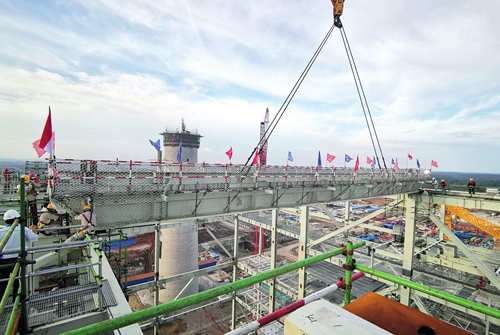BRI projects and deals accelerate despite slander from Western media
By Wang Bozun and Yang Kunyi Source:Global Times Published: 2020/6/1 18:53:40

The Bukit Asam Coal Power Plant of Indonesia is under construction on Sunday. The China-Indonesia joint project is a part of the two countries' cooperation on the Belt and Road Initiative. Photos: cnsphoto
From the Diamer-Bhasha Dam project, a hydropower station in Pakistan under the China-Pakistan Economic Corridor, to the Australian state of Victoria's recent deal with China, moves by Belt and Road Initiative (BRI) participants indicate the China-proposed initiative is accelerating its progress despite being slandered by some Western media.
Progress shows that amid uncertainties brought about by the COVID-19 pandemic, and the trade frictions between the US and other major countries, the world needs the BRI more than ever and the initiative could promote the world's economic recovery, provide opportunities for international cooperation in the health sector, Chinese experts said.
"From the international level, globalization is transforming from a centralized to a decentralized model. The BRI matches the transformation and provides more equal opportunities for developing countries," Wang Yiwei, director of the Institute of International Affairs at the Renmin University of China, told the Global Times on Monday.
"Under the global economic recession caused by the pandemic, the world needs the BRI more than ever as the inclusive initiative will promote regional and global cooperation," Wang said.
The COVID-19 pandemic has highlighted the world's weakness in disease prevention, particularly in some developing countries. Confirmed coronavirus cases have surpassed 6 million and the global death toll has topped 370,000, Wang said, adding that the world needs international cooperation to fight the pandemic, and the Health Silk Road - part of the BRI - also offers the chance for joint medical research.
According to official data, as of October 2019, China has signed 197 cooperation agreements with more than 137 countries and regions as well as 30 international organizations.
As of the end of May, many projects and deals have seen new progress, like the Diamer-Bhasha Dam project in Pakistan and the construction of 5G networks in Colombia.
Construction of the Diamer-Bhasha Dam, a hydropower station project envisaged forty years ago, began last week under the BRI. Chinese company Power China and local military engineering organization Frontier Works Organization will jointly construct the 4,500 MW dam, according to media reports.
Since March, China and Colombia have been finalizing cooperation agreements which include deals on 5G network development in the country by Chinese companies and potential joint ventures in fields including energy, technology and agriculture, according to media reports.
More contracts were closed between Chinese entrepreneurs and Colombia in the last six months than over the past 40 years, according to a report by The Diplomat.
In addition to the countries along the Belt and Road, the initiative has attracted some regions in Western countries. Australia's Victoria state, for example, has signed a memorandum of understanding with China, aiming to boost infrastructure programs in the state. According to the framework agreement between Victoria and China's National Development and Reform Commission signed in October 2018, both countries will explore industrial cooperation in the areas of high-end manufacturing, biotechnology and agriculture.
Despite the number of participants, there have been frequent criticisms of the BRI as some Western media brand the initiative a "debt trap" or claim Beijing exploits leadership tensions worldwide to push its BRI agenda.
"It is notable that no participant was forced to sign an agreement. The deals were signed based on the understanding of mutual benefit," Wang argued.
"The involvement of Victoria state, which signed a BRI deal under pressure from both Australia's federal government and the Five Eyes (Australia, Canada, New Zealand, the UK and the US), demonstrates the state truly recognizes the benefits of the initiative," Wang said.
Posted in: ECONOMY,BIZ FOCUS